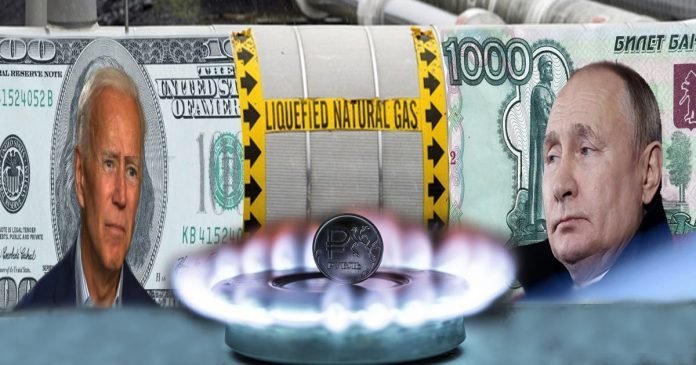Russia: “In our situation, it’s hardly possible and feasible to engage in charity for Europe”
Putin announced last week that Russia will demand unfriendly” countries pay for natural gas only in Russian currency from now on. He instructed the country’s central bank to work out a procedure for natural gas buyers to acquire rubles in Russia.
“All G7 ministers agreed completely that this [would be] a one-sided and clear breach of the existing contracts,” Habeck told journalists on Monday.
The Group of Seven major economies have agreed to reject Moscow’s demand to pay for Russian natural gas exports in rubles, the German energy minister said Monday.
Robert Habeck told reporters that all G-7 ministers agreed completely that this (would be) a one-sided and clear breach of the existing contracts. He said officials from France, Germany, Italy, Japan, the United States, the United Kingdom and Canada met Friday to coordinate their position and that European Union representatives also were present.
Habeck said that payment in rubles is not acceptable and we will urge the companies affected not to follow (Russian President Vladimir) Putin’s demand.
The minister added that “payment in rubles is not acceptable” and that the nations will urge the companies affected “not to follow” the demand issued by Russian President Vladimir Putin last week.
On Monday, Putin ordered the government, the central bank, and Gazprombank to develop the necessary tools to switch all payments for Russian natural gas from “unfriendly states” to rubles from March 31.
Asked by reporters earlier Monday if Russia could cut natural gas supplies to European customers if they reject the demand to pay in rubles, Kremlin spokesman Dmitry Peskov said in a conference call that we clearly aren’t going to supply gas for free.
In our situation, it’s hardly possible and feasible to engage in charity for Europe, Peskov said.
Asked what happens if Russia turns off the taps now, Germany’s energy minister said, We are prepared for all scenarios.
U.S. Holds World’s Top LNG Exporter Spot on European Energy Crisis
The U.S. held its ranking as the world’s top exporter of liquefied natural gas for the second month in a row, as Europe’s winter energy crisis draws more cargoes to the continent.
U.S. liquefied natural gas (LNG) exporters are emerging as big winners of Europe’s supply crisis as they export record volumes to the European Union for the third consecutive month at prices that have rallied since Russia’s invasion of Ukraine.
European gas prices have hit all-time highs just as exporters of LNG in the United States completed projects that had been under development for years to deliver abundant shale gas supplies to international markets.
U.S. LNG exports hit a record 7.3 million tons in January, taking the No. 1 spot away from Middle Eastern powerhouse Qatar for a second time since December. Europe, which is facing low winter inventories and high natural gas prices due to tensions between Russia and Ukraine, was a top destination for U.S. cargoes last month.
Reuters announced: Prices have risen so much in Europe that traders of LNG cargoes would rather pay millions of dollars in penalties for non-delivery to other countries for the opportunity to sell the cargoes at a premium to European buyers, said Oystein Kalleklev, chief executive of shipowner FLEX LNG Management.
Two sources at a major energy firm, who asked not to be named, said that over the past three months the United States has diverted several dozen cargoes to Europe from their previous Asian destinations. A typical cargo is about 3 billion cubic feet of natural gas.
The total number of U.S. cargoes shipped to Europe and Turkey in the first two months of 2022 reached a record of 164, according to Robert Songer, LNG analyst at data intelligence firm ICIS. The previous record was 125 cargoes in the first quarter of 2020, he said.
The 6.4 million tonnes of LNG exported from the United States in February, equivalent to around 307 billion cubic feet of gas, would have been worth about $17.2 billion in Europe at $56 per mmBtu or $13.5 billion in Asia at $44 per mmBtu, according to Reuters calculations.
Joe Biden Has Multiple Ties to Liquefied Natural Gas Pioneer Cheniere Energy.
Of course, Joe Biden would have his fingers in all the pies, and we are not just talking about the controversial Hunter/Joe Biden’s Ukraine gas exploits but Biden’s close relationship with U.S. LNG giants are personal and are extensive.
Andrew Goldman, the co-founder of Western LNG and a former Biden adviser was also one of Biden’s biggest donors.
.@Eyesgack of @sunrisemvmtChi asks: How can we expect @JoeBiden to hold fossil fuel executives accountable when he's going to a fundraiser hosted by one tomorrow?
— Sunrise Movement 🌅 (@sunrisemvmt) September 5, 2019
If the climate crisis is serious to Joe, he should stop holding fundraisers w/ oil profiteers #NoFossilFuelMoney pic.twitter.com/Rfq0u3NITj
His ties to Goldman bring into focus his significant connections to the much larger liquefied natural gas firm Cheniere Energy. Goldman’s fellow Western LNG co-founder, CEO Davis Thames, was previously senior vice president and chief financial officer of Cheniere Energy, a company that paid Biden’s current climate adviser more than a million dollars to serve on its board until 2018. And a former Biden adviser lobbied for the company.
Cheniere, which is based in Houston and took in $2.8 billion in revenue in 2018, “pioneered the development of LNG exports from the ‘Lower 48’ of the United States at its Sabine Pass LNG terminal,” according to a Western LNG press release. The company is currently developing a natural gas facility in Western Canada, intended to supply gas to Asia.
Exporting natural gas from North America, a practice that the Obama administration dramatically accelerated facilitates the global consumption of fossil fuels and increases methane emissions, which contribute significantly to climate change. When Biden was vice president, his administration oversaw the biggest natural gas production expansion in U.S. history and lifted the crude oil export ban for the first time in 40 years. President Trump is continuing Obama’s exports policies and helped cement a 2017 deal for Cheniere to export billions of dollars worth of natural gas to China.
Support Independent Journalism Today
Our unwavering dedication is to provide you with unbiased news, diverse perspectives, and insightful opinions. We're on a mission to ensure that those in positions of power are held accountable for their actions, but we can't do it alone. Labour Heartlands is primarily funded by me, Paul Knaggs, and by the generous contributions of readers like you. Your donations keep us going and help us uphold the principles of independent journalism. Join us in our quest for truth, transparency, and accountability – donate today and be a part of our mission!
Like everyone else, we're facing challenges, and we need your help to stay online and continue providing crucial journalism. Every contribution, no matter how small, goes a long way in helping us thrive. By becoming one of our donors, you become a vital part of our mission to uncover the truth and uphold the values of democracy.
While we maintain our independence from political affiliations, we stand united against corruption, injustice, and the erosion of free speech, truth, and democracy. We believe in the power of accurate information in a democracy, and we consider facts non-negotiable.
Your support, no matter the amount, can make a significant impact. Together, we can make a difference and continue our journey toward a more informed and just society.
Thank you for supporting Labour Heartlands












